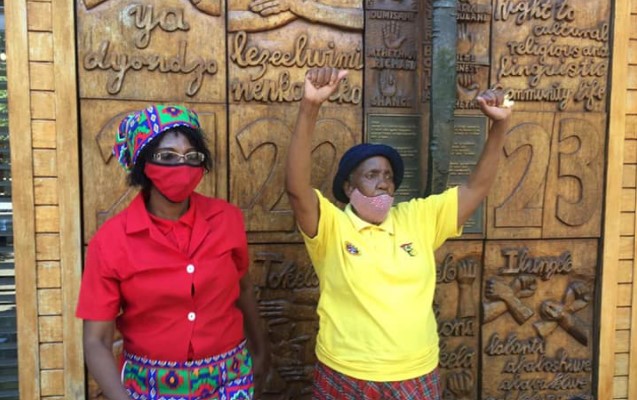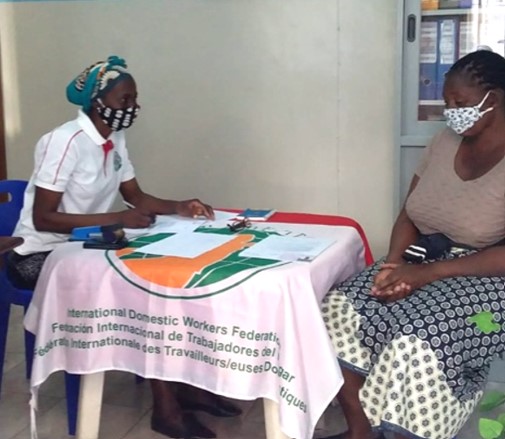
Jun 15, 2021
On June 16 International Domestic Workers Day, domestic workers are celebrating a landmark legal win by South Africa’s domestic workers for colleagues who die or are injured in their employers’ homes. For the first time, starting this year, domestic workers who suffer injury on the job are eligible for compensation for temporary and permanent disability, medical expenses, funeral costs and survivor benefits.
Until last year, South Africa’s approximately 1 million privately employed domestic workers suffered deaths and crippling injuries without access to compensation for themselves or their dependents because domestic workers were excluded from South Africa’s Compensation for Occupational Injury and Illness Act (COIDA). With Solidarity Center support, the South African Domestic Service and Allied Workers Union (SADSAWU) and human rights organization Socio-Economic Rights Institute of South Africa (SERI) litigated and won a long-denied claim for the dependent daughter of Maria Mahlangu, a privately employed and partially sighted domestic worker who had fallen into her employer’s swimming pool and drowned in 2012. The historic judgment, made by the South African Constitutional Court in mid-November, recognized that injury and illness arising from work as a domestic worker in a private home is no different to that occurring in other workplaces and thus equally deserving of COIDA coverage.
Myrtle Witbooi, general secretary of SADSAWU and the first president of the International Domestic Workers Federation (IDWF), said in addition to the last year’s court ruling, South Africa’s domestic workers can also celebrate this year’s hard-fought win under revised compensation rules of three years of retroactivity to submit claims.
Under the new rules, all employers of domestic workers must register with the Compensation Fund or face penalties, and make annual payments to cover their employees. SADSAWU is focusing its efforts on educating employers and domestic workers about their obligations and rights under the new rules, says Witbooi. SERI made a new domestic worker compensation information fact sheet available to domestic workers, paralegals and community advice offices this month, while SADSAWU is producing and distributing an educational WhatsApp video and pamphlet and translating the amendment into local languages.
The unions and SERI continue to press the government for more time for domestic workers to submit claims and increase retroactivity. “We must remain that beacon of hope for workers,” says Witbooi.
Meanwhile, another domestic worker, Nobuhle Ndlovu, drowned in her employer’s swimming pool last month.
Ten years after the adoption of an International Labor Organization (ILO) Convention confirmed their labor rights, domestic workers across the globe are still fighting for recognition as workers and essential service providers, as documented by a new ILO report. And, although 32 countries have ratified Domestic Workers Convention 189, and 29 have entered the convention into force, most of the world’s 75.6 million domestic workers are still being denied social protection rights, including access to national health insurance, pension schemes and compensation funds.

Jun 2, 2021
A police crackdown against Lesotho garment workers protesting a two-year delay in scheduled minimum wage increases resulted in two fatalities in Maseru, the capital, last week. Pitso Mothala and Motselisi Ramasa died as police fired into the crowd. Many more workers were injured.
The deaths come after two weeks of escalating state-sponsored attempts to use shootings, beatings and arrests to force thousands of the country’s 50,000 garment workers to return to their factories. Meanwhile, government ministries have rejected union attempts to negotiate an end to protests and are still refusing to provide garment workers with the wage increases they need to sustain themselves and their families through the COVID-19 pandemic, reports United Textile Employees (UNITE).
“We want justice for our brutal[ally] killed comrades and we shall forever make sure that their blood is not in vain,” says a UNITE media release that identifies the two slain garment workers by name. Garment workers remain at home this week while the country’s armed forces continue to patrol the industry, reports the union.
The country’s unions are refusing to return to work until the government makes good on two missed incremental minimum wage increases—for 2020/2021 and 2021/2022—that have been delayed indefinitely.
Lesotho has a long history of human rights violations against political and labor activists, including police violence against peacefully striking factory workers rallying for fair wages last year. The 45th annual U.S. Department of State, Bureau of Democracy, Human Rights and Labor Human Rights report on Lesotho found that members of the Lesotho Mounted Police Service and Lesotho Defense Force last year committed numerous human rights abuses, including “unlawful or arbitrary killings; torture and cases of cruel, inhuman, or degrading treatment or punishment; harsh and life-threatening prison conditions [and] arbitrary arrest or detention.”

May 19, 2021
In a demonstration of Lesotho’s widely reported troubled human rights record, peacefully protesting garment workers rallying since Friday for two promised, but indefinitely delayed, minimum wage increases were met on Monday in the capital, Maseru, and surrounding areas with police violence and intimidation.
“Eight workers today were hospitalized after being shot at with rubber bullets and—in one instance—live rounds,” reported National Clothing Textile and Allied Workers Union (NACTWU) General Secretary Sam Mokhele to the Solidarity Center.
Unions say the government deployed special forces, with police shooting 12 people—including two children, ages 7 and 9—in Maputsoe and Maseru, and beating and arresting others.
“Our garment worker members, with whom we are already addressing rampant gender-based violence in their factories, want the world to know that their peaceful rallies in support of scheduled wage increases were met with outsize police violence,” says Independent Democratic Union of Lesotho (IDUL) Deputy General Secretary May Rathakan.
Lesotho’s unions, including garment workers, are imploring the government to make good on two missed incremental minimum wage increases—for 2020/2021 and 2021/2022—that were due to be implemented by government gazette publication on April 1 but have been delayed indefinitely.
“These acts had exposed the workers to absolute poverty because their current salaries cannot address their needs,” says United Textile Employees (UNITE) General Secretary Solong Senohe in a media statement.
Six private-sector Lesotho unions warned almost two weeks ago of a possible work stoppage starting last Friday should promised minimum wage increases continue to be delayed. In addition to IDUL, NACTWU and UNITE, the Construction, Mining and Quarry Trade Union (CMQ), Lentsoe La Sechaba Trade Union (LESWA) and the Lesotho Workers Association (LEWA) also protested.
Lesotho has a long history of human rights violations against political and labor activists, including police violence against peacefully striking factory workers rallying for fair wages last year. The 45th annual United States Department of State, Bureau of Democracy, Human Rights and Labor Human Rights report on Lesotho found that members of the Lesotho Mounted Police Service and Lesotho Defense Force last year committed numerous human rights abuses, including “unlawful or arbitrary killings; torture and cases of cruel, inhuman, or degrading treatment or punishment; harsh and life-threatening prison conditions [and] arbitrary arrest or detention.”
Solidarity Center Africa Regional Program Director Christopher Johnson says: “State violence in response to garment workers’ legitimate and peaceful demands for a livable minimum wage flies in the face of human rights norms.”
The right to strike has been enshrined in the constitutions of at least 90 countries and “has in effect become customary international law,” said UN rights expert and former UN Special Rapporteur on the rights to freedom of peaceful assembly and of association Maina Kiai in 2017, citing global and regional instruments that include ILO Convention No. 87 (Articles 3, 8 and 10), the International Covenant on Economic, Social and Cultural Rights (Article 8), the International Covenant on Civil and Political Rights (Article 22), the European Convention on Human Rights (Article 11), and the American Convention on Human Rights (Article 16).
May 17, 2021
A Kyiv mine worker rally protesting $71 million wage theft by state-owned coal-mining enterprises last week resulted in multiple concessions from the country’s Ministry of Energy. These included:
- Transferring more than $30 million on May 12 to state-owned coal mining companies’ accounts to pay back wages
- Directly paying back wages from the first three months of this year to non-industrial employees
- Committing to meeting regularly with the Independent Trade Union of Miners of Ukraine (NPGU) to strategize on the industry’s future
- Working with the Independent Trade Union of Miners of Ukraine (NPGU) to appropriately address low coal prices—including working toward a total ban on electricity and coal imports from Russia and Belarus, where oligarch control and failure to respect internationally accepted worker rights enables the low coal prices that are pushing Ukraine’s miners out of work.
“People who work in dangerous conditions, risk their lives every day and whose work depends on the country’s energy security must not be humiliated” said NPGU Chairperson Mykhailo Volynets during the rally.
The May 12 rally, which was located near Ukraine President Volodymyr Zelensky’s Kyiv office, brought together more than 500 mine workers from Donetsk, Luhansk, Lviv and Volyn. Protestors asserted Ukraine citizens’ constitutional right to renumeration for work performed, highlighted the difficult conditions for families of miners suffering wage theft and demanded postponement of labor-related draft laws that would eliminate labor and trade union rights. The rally follows on the heels on an 11-day protest last year over the same issues.
Energy Minister Herman Galushchenko said that, going forward, his ministry is committed to regular meetings with energy sector union leaders and miners to address long-term problems. “We are always open to dialogue and discussion of transformation concepts… But, for this, we need to work out mechanisms for constant normal communication,” he said.
In recognition of the Ministry of Energy’s concessions, NPGU suspended the protest. However, warned Volynets: “[T]he miners are ready to return with protests if the authorities, the government, the new Minister of Energy do not listen.”

May 11, 2021
The International Domestic Workers Federation (IDWF) is urging more than 25 Africa-based affiliates to use the results of a new survey documenting the suffering of Africa’s domestic workers and their dependents during the pandemic to lobby their governments for urgent reform. Conducted by domestic workers with 3,419 of their peers in 14 African countries from November 2020 through January 2021, the survey found that only 17 percent of respondents received emergency income, food or other state-provided social support—and that most of that number received such support through another household member because they were not themselves eligible.
“It’s one thing to lose your job, it’s another thing to lose your job in a context where you don’t have access to unemployment benefits, social security or any income support,” says IDWF Lead Research Associate Louisa Acciari and post-doctoral researcher at the Federal University of Rio de Janeiro. “I think this is something where the unions can really campaign at the national level to get more inclusive social protection policies.”
Only 6 percent of those unable to work received employer-provided wages, while almost one-third of survey respondents were laid off—85 percent of whom were the main family breadwinner. They received no severance pay and remained out of work for up to six months. Nearly half of survey respondents suffered income reduction that had a dramatic impact on their household and was exacerbated by rising food and transportation costs.
During a recent event, IDWF leaders urged affiliates to use survey data in national campaigns lobbying their governments for inclusion of domestic workers in unemployment, health insurance, injury and illness compensation, and pension schemes, and for ratification of ILO Conventions ILO Conventions 189 on Domestic Workers and 190 on Violence and Harassment.
“Now we have an additional tool to fight until we get our rights, our social protections. People will remember what we say if they hear us saying [it] with numbers,” said IDWF General Secretary Elizabeth Tang.
More than 25 IDWF affiliates conducted peer-to-peer surveys in English, French, Portuguese and multiple local languages in Burkina Faso, Ethiopia, Guinea, Ivory Coast, Kenya, Malawi, Mozambique Namibia, Senegal, South Africa, Tanzania Togo, Uganda and Zambia.
“Through it all, the IDWF has shown the world that we are united,” said IDWF President and General Secretary of the South African Domestic Service and Allied Workers Union (SADSAWU). “There is much more to be done.”
Based on survey findings, IDWF recommendations include that governments:
- Conduct awareness-raising campaigns regarding occupational health and safety standards, worker rights and employer responsibilities
- Distribute personal protective equipment at key access points such as bus and taxi stands
- Introduce price controls
- Expand income-support measures to domestic workers
- Extend contributory social insurance to domestic workers
- Where absent, introduce contributory unemployment benefits for domestic workers
- Ratify ILO Conventions 189 and 190 and adopt complementary national legislation for implementing an appropriate enforcement framework
- Adopt legislative reforms to ensure effective expansion of social protection to domestic workers.
“The Impact of COVID-19 on Domestic Workers of Africa” survey is part of a global IDWF research project that includes Latin America and the Middle East and North Africa. Around the world, the pandemic has vastly widened gender, racial and economic divisions. CEOs have raked in record profits during the pandemic, and 8 of the 10 wealthiest people in the world have grown billions of dollars richer over the past year. On the other side, domestic workers, agricultural workers, trash collectors, street vendors and a growing number of gig workers employed through app-based services were recognized as essential over the last year and hailed as heroes, yet are among the most economically undervalued and underserved. The COVID-19 crisis cost women around the world at least $800 billion in lost income in 2020, equivalent to more than the combined GDP of 98 countries, said Oxfam last month.
The Solidarity Center partners with the IDWF around the world, supporting domestic workers’ efforts to access their rights. As of April 2021, the IDWF has 81 affiliates from 63 countries.



